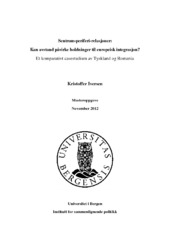| dc.description.abstract | Abstract This master thesis is at hypothesis-generating case stadium focusing on center-periphery relations between EU and its member countries. Center-periphery relations between EU as an organization and its member countries is operationalized in two parts: spatial distance, referring to geographical distance form EUs political center; and distance in time, referring to distance in terms of when countries get membership status with the EU. I seek to explain if and how distance affect European citizens' attitude towards further political integration with the European Union. The research question is: Does center-periphery relations, in the sense of distance to the European Union as an organization, affect the citizens of different member states when it comes to desired degree of integration? Although there has been carried out a great deal of research on factors that could affect citizens attitudes towards the integration process in EU, distance as either an direct or indirect cause for support is largely uncharted territory. I argue that most of the research is focused on factors connected to either the political, economic or cultural spheres. I don't contest that those factors affect citizen's attitude towards integration but, I argue that distance can help understanding the intricate reasons behind citizen's attitudes towards integration. In this master thesis I start out by showing, through descriptive statistics of Eurobarometer data, that there is a cleavage between the original six countries of EU and the rest of the later arriving member countries, when it comes to wanting more integration. With this as a basis I set out to study if and how the difference in distance affects the citizens in two case countries; Romania and Germany. The data used in this study is collected through expert interviews. One of the central findings of this study is that most of the experts, more or less, contest that distance indirectly affect degree of wanted integration through four factors; identity attachment to the EU, feeling of ownership towards the EU; view on EUs legitimacy; participation in EU public sphere. But, when it comes to explaining the differences between member countries in the center of EU and the periphery of EU, when it comes to wanting more integration they all, in some form or other, use distance to explain why the citizens of central member countries seems to be more positive towards integrating further than the citizens of member countries finding themselves in the periphery. | en_US |
